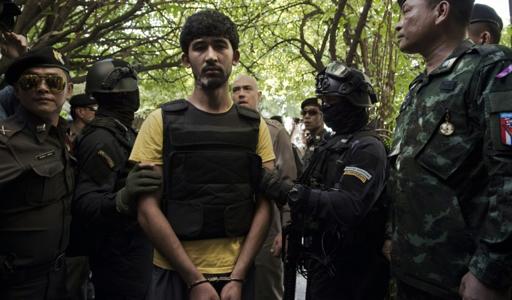A key suspect in last month's deadly Bangkok blast handed the backpack bomb to a man in a yellow T-shirt later seen placing it at a busy shrine moments before it detonated, Thai police said Wednesday.
The revelation came as investigators gave their most detailed account of how the alleged network of bombers coordinated the attack, including through drop-offs and WhatsApp text messages.
Mystery still surrounds the motive of the group accused of being responsible for the August 17 bombing that left 20 people dead in the heart of Bangkok and rocked Thailand's key tourist industry.
But after appearing flat-footed in response to the unprecedented attack, police have trumpeted the arrest of two foreigners and say they have identified several other suspects.
One of the two men in custody, Yusufu Mieraili, was detained last week near the border with Cambodia and has since been quizzed by military and police investigators.
Mieraili, 25, who was holding a Chinese passport when he was caught, has admitted to playing a central role in the operation, according to police.
On Wednesday he was taken on a second re-enactment of his alleged role in the crime -- a standard police procedure.
"This is the area where he met the man in a yellow shirt to exchange the backpack," national police spokesman Prawut Thavornsiri told reporters outside a Bangkok railway station, later adding he received his orders via WhatsApp.
Local media reports have named the bomb mastermind as "Izan", saying he commissioned and guided the attack but left the country a day before it was carried out.
But Prawut refused to be drawn on details of who pulled the strings behind the blast.
He did reveal that Mieraili, whose hands were bound while he wore a bulletproof vest during the re-enactment, left a "heavy backpack" with the bomber outside the station some thirty minutes from the crime scene.
That man was seen on security footage apparently placing the same bag at the shrine and calmly walking off just before the blast.
- Acting on orders -
After making the exchange, Mieraili was ordered to wait near the shrine to take photos of the aftermath of the bomb, Prawut said.
But when he got there his view was blocked by a pillar so he left.
Police have not revealed Mieraili's nationality, although the birthplace on the passport he was found with is listed as Xinjiang -- home to China's Muslim Uighur minority and often hit by unrest.
Prawut Wednesday said they believed Yusufu's passport was genuine and that he is known to have studied chemistry and medical science, but he declined to say where.
In later comments Thailand's police chief admitted Yusufu had illegally entered Thailand multiple times through a border crossing with Cambodia.
"I cannot ignore this problem because I feel ashamed," General Somyot Poompanmoung told reporters as he called on the government to help him clamp down on corrupt border officials.
Speculation has hardened on links to China's Turkic-speaking Uighur minority, many of whom complain of religious and cultural discrimination.
Thailand deported scores of Uighurs to China early in the summer, prompting protests in Turkey where some nationalists hold a deep affinity with the minority group.
A second man identified as Adem Karadag was caught before Mieraili in a flat in a Bangkok suburb with bomb-making paraphernalia and dozens of fake Turkish passports. Arrest warrants are out for 10 others, including two people believed to be in Turkey.
Despite the mounting evidence of a possible Uighur link, Thailand's police and junta have been at pains to rule out the idea that the Chinese were deliberately targeted.
Instead police say the bombing was carried out by a criminal network motivated by revenge after a people-smuggling trade was disrupted -- a line security experts have met with scepticism.






















































